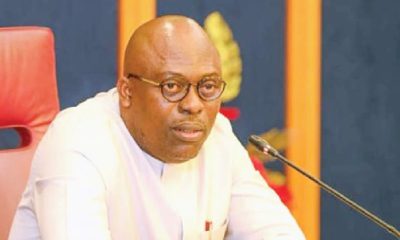NEWS
Court Validates Rivers LG Polls, Strikes Out Suit

In a significant legal and political development, a Rivers State High Court sitting in Port Harcourt has struck out a suit challenging the legitimacy of the recent local government council election and the appointment of a State Sole Administrator. The suit, filed by legal practitioner Williams Abayomi Stanley, was dismissed on two core grounds: the court’s lack of jurisdiction to hear the matter and the claimant’s lack of a direct legal standing. The ruling by Justice Stephen Jumbo effectively validates the actions of President Bola Tinubu’s administration in the state and cements the legality of the August 30 local government council elections, an exercise that has been at the center of the state’s protracted political crisis. The decision is being seen as a major victory for the faction of the Peoples Democratic Party (PDP) aligned with the Federal Government, ending a legal challenge that threatened to invalidate the electoral process and the new political leadership.
The lawsuit was an attempt to challenge the legality of President Tinubu’s declaration of a state of emergency in Rivers and the subsequent appointment of Sole Administrator Ibok-Ete Ibas. In turn, Ibas had nominated the Chairman and members of the Rivers State Independent Electoral Commission (RSIEC) to conduct the local government elections. The claimant, Stanley, argued that these actions were unconstitutional. However, the presiding judge, Justice Jumbo, held that the court lacked the substantive jurisdiction to hear the case. Citing the Emergency Powers Act of 1961, the judge explained that under the constitution, only the Supreme Court has the exclusive jurisdiction to entertain suits filed during an emergency rule. This ruling reinforces the hierarchy of the Nigerian legal system and the special legal provisions that come into effect during a state of emergency, a political tool that was invoked by the president to quell the escalating power struggle between Governor Siminalayi Fubara and his predecessor, Nyesom Wike.
In a second and equally fatal blow to the claimant’s case, Justice Jumbo ruled that Stanley lacked the legal standing, or ‘locus standi,’ to institute the suit. The judge held that the claimant had failed to demonstrate a personal interest in the matter beyond that of a concerned citizen. He stated that the claimant did not provide sufficient proof of any personal injury, a threat of injury, or hardship he would suffer if the issues in his originating summons were not addressed. In a crucial observation, Justice Jumbo noted that the interest the claimant sought to protect was not his personal one but that of the state governor, a position he does not occupy. This legal principle, widely used in Nigerian jurisprudence, requires that a person must be directly affected by an action to have the right to challenge it in court. The court’s decision in this regard sends a clear message that legal suits cannot be instituted on behalf of a third party without a direct and personal stake.
While the court ruled against the claimant, Justice Jumbo did not award any costs against him. Following the judgment, counsel to the claimant, Godsent Elewa, expressed his disagreement with parts of the ruling but stated that he would consult with his client before deciding on the next line of action. He confirmed that they would likely appeal the ruling, particularly on the issues of locus standi and the court’s jurisdiction. Elewa insisted that while he respected the judge’s wisdom, he believed there were aspects of the judgment that were open to challenge at a higher court. On the other hand, counsel to the Peoples Democratic Party (PDP), which was the fifth defendant in the suit, Monday John Otokwala, hailed the judgment as a testament to the law. He stated that the court’s decision “represents the position of the law with respect to the conduct of the local government elections in Rivers State,” further legitimizing the outcome of the August 30 poll.












